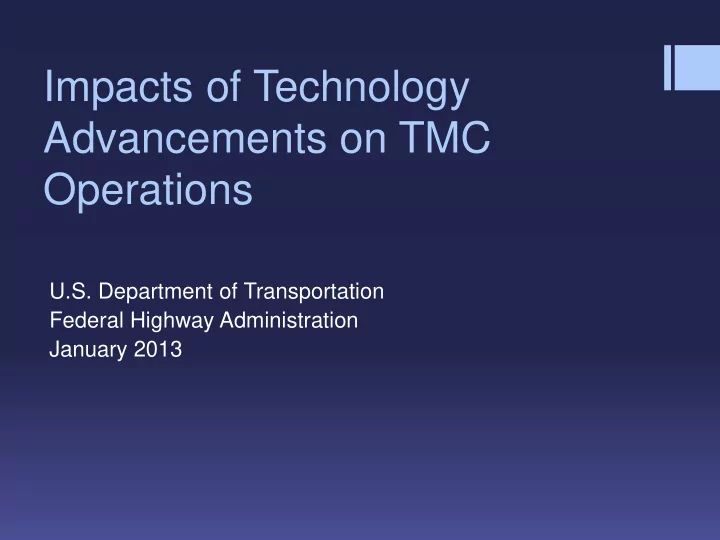

Impacts of Technology Advancements on TMC Operations U.S. Department of Transportation Federal Highway Administration January 2013
Overall Principals Communication Coordination Cooperation
Eight TMC Operations Top Trends
Nimble Service-Oriented Program Mindset and Organizational Structure Represents the framework of being positioned to successfully select and rapidly adopt changing technologies and processes. Foster and agency culture of embracing technology change Create training program Promote a culture of open communication Adopt standards on equipment and processes Use open-source or non-proprietary when possible
Active Transportation and Demand Management (ATDM) Concept Using a variety of tools at one’s disposal to proactively make operations more efficient, including through staff and technology. Implement a suite of emerging transportation concepts, coordinating as necessary Active Traffic Management (lane control, variable speed limits, hard shoulder) Real time transit, parking, traffic info Ramp metering, signal timing Road weather integration Opportunities to share resources (communications networks, cameras)
Accommodating Toll and other Pricing Operations Integrating pricing in operations encourages obtaining revenue through tolling and financing infrastructure expansion. Develop protocols for operations Pricing Incident management Start early in feasibility planning
Performance Monitoring and Management Increasing data collection and analysis can lead to improved operations, enhanced customer service and documented effectiveness. Use results of performance monitoring related to agency goals to support funding requests Performance measures to support staff performance, fulfilling agency goals Outputs vs. Outcomes
Automation Tools and Related Tools to Increase Efficiency New technologies that improve system management and cost-effectiveness thus resulting in greater productivity. Increase operator efficiency Develop decision support systems Specify automation Predictive analysis and forecasting anticipating congestion Consolidate across agencies
Involvement of Third Parties in Data and Traveler Information Utilizing data services that third-party vendors provide to manage roadway traffic and deliver traveler information to the public. Develop pre-qualifications or standards regarding data accuracy and validation (data received and sent) Provide real-time data to third party app developers Share data among agencies
Mobile Communications and Wireless Networks Advances in wireless technology provide options when it comes to modernizing field equipment and increasing data coverage. Coordinate with IT staff to develop firewalls and other security protocols that are effective without limiting functionality. Efficiently expand field device coverage and operations cost using wireless Allow appropriate remote access with partner agencies
Social Media for Traveler Information and Crowd Sourcing Using social networking tools to receive and distribute information among agencies, travelers, and third parties. Develop procedures and protocols for use of social media. Foster relationships among public relations groups Partner with private sector to facilitate social media outlets and realize cost efficiencies
Questions Full Report @ www.ops.fhwa.dot.gov
Recommend
More recommend